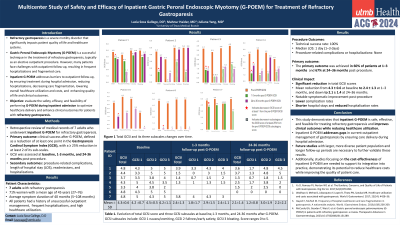Monday Poster Session
Category: Interventional Endoscopy
P2754 - Multicenter Study of Safety and Efficacy of Inpatient Gastric Peroral Endoscopic Myotomy (G-POEM) for Treatment of Refractory Gastroparesis
Monday, October 28, 2024
10:30 AM - 4:00 PM ET
Location: Exhibit Hall E

Has Audio

Lucia Soca Gallego, DO
University of Texas Medical Branch
Galveston, TX
Presenting Author(s)
Lucia Soca Gallego, DO, Mahnur Haider, MD, Juliana Yang, MD
University of Texas Medical Branch, Galveston, TX
Introduction: Refractory gastroparesis is often associated with poor quality of life and high healthcare costs, partly due to care fragmentation, recurrent hospitalizations, and significant readmission rates.
Gastric Peroral Endoscopic Myotomy (G-POEM) is a successful technique used to treat refractory gastroparesis, typically as an elective, outpatient procedure. However, patients with gastroparesis frequently face challenges with outpatient follow-up. Therefore, performing G-POEM while admitted for gastroparesis can ensure delivery of necessary care and reduce hospitalizations. This study demonstrates the safety, efficacy, and feasibility of inpatient G-POEM in patients who previously faced challenges with outpatient follow-up for gastroparesis.
Methods: Medical records were analyzed to obtain clinical characteristics and procedural data of adults who underwent inpatient G-POEM for gastroparesis treatment. The primary outcome was clinical success after G-POEM, defined as one score decrease in the Gastroparesis Cardinal Symptom Index (GCSI) with ≥ 25% decrease in at least 2 of its sub-scales. GCSI was assessed at baseline, 1-3 months, and 24-36 months. Other outcomes were complications, length of hospital stay (LOS), readmissions, and hospitalizations.
Results: Seven patients underwent inpatient G-POEM for gastroparesis. All patients had frequent hospitalizations and high healthcare utilization. Majority (71%) were women, mean age of 45 (27–76), and average symptom duration of 40 months (5–108 months). Average GCSI scores were 4.3±0.6 at baseline, 2.4±1.3 at 1–3 months, and 2.1±1.4 at 24-36 months. At follow-ups, 5/7 (71%) patients achieved the primary outcome. Technical success rate was 100%, median LOS of 1 day (1–3 days), with zero procedure-related complications. There was one emergency visit and no hospitalizations. Participants of inpatient G-POEM had overall decreased GSCI scores associated with symptomatic improvement, lower complications, and decreased hospitalizations. (Table).
Discussion: Our findings demonstrate that inpatient G-POEM is safe, effective, and feasible in terms of clinical response, reducing care fragmentation and hospitalizations. Patients had significant improvement in symptoms, shorter LOS, and reduced readmissions and hospitalizations. Future studies of cost-effectiveness may help incorporate inpatient G-POEM into practice to reduce healthcare costs and improve quality of care.
Note: The table for this abstract can be viewed in the ePoster Gallery section of the ACG 2024 ePoster Site or in The American Journal of Gastroenterology's abstract supplement issue, both of which will be available starting October 27, 2024.
Disclosures:
Lucia Soca Gallego, DO, Mahnur Haider, MD, Juliana Yang, MD. P2754 - Multicenter Study of Safety and Efficacy of Inpatient Gastric Peroral Endoscopic Myotomy (G-POEM) for Treatment of Refractory Gastroparesis, ACG 2024 Annual Scientific Meeting Abstracts. Philadelphia, PA: American College of Gastroenterology.
University of Texas Medical Branch, Galveston, TX
Introduction: Refractory gastroparesis is often associated with poor quality of life and high healthcare costs, partly due to care fragmentation, recurrent hospitalizations, and significant readmission rates.
Gastric Peroral Endoscopic Myotomy (G-POEM) is a successful technique used to treat refractory gastroparesis, typically as an elective, outpatient procedure. However, patients with gastroparesis frequently face challenges with outpatient follow-up. Therefore, performing G-POEM while admitted for gastroparesis can ensure delivery of necessary care and reduce hospitalizations. This study demonstrates the safety, efficacy, and feasibility of inpatient G-POEM in patients who previously faced challenges with outpatient follow-up for gastroparesis.
Methods: Medical records were analyzed to obtain clinical characteristics and procedural data of adults who underwent inpatient G-POEM for gastroparesis treatment. The primary outcome was clinical success after G-POEM, defined as one score decrease in the Gastroparesis Cardinal Symptom Index (GCSI) with ≥ 25% decrease in at least 2 of its sub-scales. GCSI was assessed at baseline, 1-3 months, and 24-36 months. Other outcomes were complications, length of hospital stay (LOS), readmissions, and hospitalizations.
Results: Seven patients underwent inpatient G-POEM for gastroparesis. All patients had frequent hospitalizations and high healthcare utilization. Majority (71%) were women, mean age of 45 (27–76), and average symptom duration of 40 months (5–108 months). Average GCSI scores were 4.3±0.6 at baseline, 2.4±1.3 at 1–3 months, and 2.1±1.4 at 24-36 months. At follow-ups, 5/7 (71%) patients achieved the primary outcome. Technical success rate was 100%, median LOS of 1 day (1–3 days), with zero procedure-related complications. There was one emergency visit and no hospitalizations. Participants of inpatient G-POEM had overall decreased GSCI scores associated with symptomatic improvement, lower complications, and decreased hospitalizations. (Table).
Discussion: Our findings demonstrate that inpatient G-POEM is safe, effective, and feasible in terms of clinical response, reducing care fragmentation and hospitalizations. Patients had significant improvement in symptoms, shorter LOS, and reduced readmissions and hospitalizations. Future studies of cost-effectiveness may help incorporate inpatient G-POEM into practice to reduce healthcare costs and improve quality of care.
Note: The table for this abstract can be viewed in the ePoster Gallery section of the ACG 2024 ePoster Site or in The American Journal of Gastroenterology's abstract supplement issue, both of which will be available starting October 27, 2024.
Disclosures:
Lucia Soca Gallego indicated no relevant financial relationships.
Mahnur Haider indicated no relevant financial relationships.
Juliana Yang indicated no relevant financial relationships.
Lucia Soca Gallego, DO, Mahnur Haider, MD, Juliana Yang, MD. P2754 - Multicenter Study of Safety and Efficacy of Inpatient Gastric Peroral Endoscopic Myotomy (G-POEM) for Treatment of Refractory Gastroparesis, ACG 2024 Annual Scientific Meeting Abstracts. Philadelphia, PA: American College of Gastroenterology.
